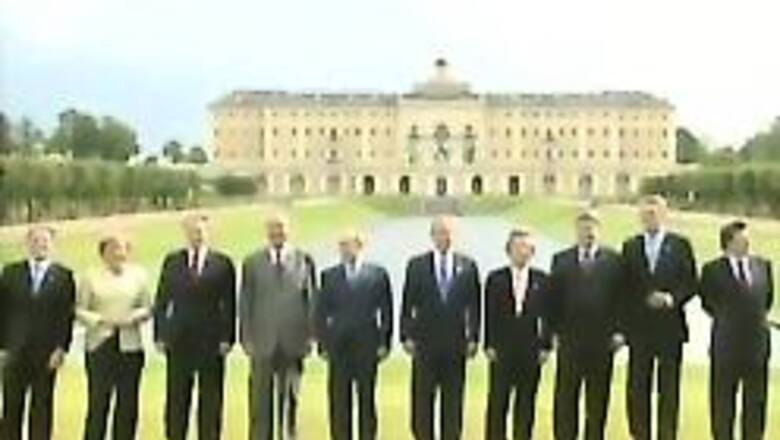
views
New Delhi: Leaders attending the ongoing G8 summit in Russia have asked both Hezbollah and Israel to show restraint and end the violence in the Middle East.
In a statement from the summit, the G8 leaders asked Hezbollah to free abducted Israeli soldiers and immediately halt attacks on Israel.
The G8 leaders urged Israel to end military operations and withdraw forces from Gaza.
The statement made no reference to criticism by France and the European Union that Israel's bombing of Lebanon was excessive.
''These extremist elements and those that support them cannot be allowed to plunge the Middle East into chaos and provoke a wider conflict,'' the G-8 leaders said in a statement. ''The extremists must immediately halt their attacks.''
Forged in delicate negotiations, the statement represented a consensus by the leaders of the United States, Russia, Britain, France, Germany, Italy, Canada and Japan. But the wording allowed leaders to read the document in different ways, reflecting varying alliances by summit partners with players in the Middle East and conflicting views over whether Israel was using excessive force.
French President Jacques Chirac said ''it is evident that the G-8 is calling for a cease-fire.'' Not so, said the United States. ''There was no push by any country for a cease-fire,'' said Nicholas Burns, undersecretary of state for political affairs.
The Bush administration argued that the statement obviously blamed Syria and Iran for the crisis, although neither country was explicitly named.
The statement demanded the return, unharmed, of the Israeli soldiers, an end to the shelling of Israeli territory and a halt to Israeli military operations.
But it echoed support for Israel's right to self-defence voiced by the United States.
The Bush administration, which has declined to pressure Israel to holds its fire, said the call for a halt to Israeli strikes was conditioned on the soldiers' release and the end of missile attacks on Israel. The statement was unclear on those points.
''We do not want to let terrorist forces and those who support them have the opportunity to create chaos in the Middle East,'' German Chancellor Angela Merkel told reporters after the leaders met at an 18th century palace.
PAGE_BREAK
She said they believe that ''first of all, that the Israeli soldiers must be returned unharmed, that the attacks on Israel must stop and that then, of course, also the Israeli military action must be ended.''
Bush for the first time pressed Israel to show moderation. ''Our message to Israel is, look, defend yourself, but as you do so, be mindful of the consequences. And so we've urged restraint.'' Other US officials have made similar statements but it was the most explicit call yet by Bush.
The United States refused to endorse calls for a cease-fire, saying that must be accompanied by constraints on Hezbollah, Hamas, Syria and Iran.
The urgency of the deliberations was demonstrated by Russia's decision to evacuate its citizens from Lebanon. The United States evacuated at least 21 Americans from Lebanon to Cyprus on Sunday. Britain and France made plans get their people out, too.
Chirac, often at odds with Bush, told the president ''we share the same views of the issues at stake here'' and called for implementation of Security Council resolution 1559, which requires the disarming of Hezbollah and other militias in Lebanon.
Bush also got support from British Prime Minister Tony Blair, who said the only way to halt the hostilities was to acknowledge that extremists are trying to block peace between Israel and the Palestinians. ''There are also extremists backed, I'm afraid, by Iran and by Syria, who want to disrupt the positions in Lebanon and who want to create a situation of tension and hostility there.''
Russian President Vladimir Putin, host of his country's first G-8 summit, called the declaration ''a compromise formulation that in my mind is quite balanced.''
Holding his second straight late-night news conference wrapping up the day's discussions, Putin said he and Blair had led efforts Sunday to reach compromise language on Lebanon during the talks with other G-8 leaders.
Originally, the summit had been expected to deal with nuclear crises involving North Korea and Iran, but those issues appeared overtaken by events in the Middle East.
PAGE_BREAK
The UN Security Council voted unanimously Saturday to demand that North Korea suspend its ballistic missile program. World powers rebuked Iran on Wednesday when they went to the Security Council to seek possible punishment, saying it had given no sign it means to negotiate seriously over its disputed nuclear program. Iran said Sunday that an incentive package was ''an acceptable basis'' for talks.
Bush met on the summit sidelines with Chinese President Hu Jintao, who said they agreed to press for the resumption of stalled six-party talks to stop North Korea's nuclear program, and to seek a peaceful solution to the Iran stalemate.
German and US officials said it was up to Hezbollah to make the first move.
The leaders also issued joint declarations that called for bolstering energy security, fighting infectious diseases and improving education. But they got scant attention in the crisis atmosphere over the Middle East.
Lebanese guerillas fired at least 20 rockets into the northern Israeli city of Haifa, killing eight people at a train station. The strike came after Israel, in its fiercest bombardment yet of the Lebanese capital, reduced Beirut apartment buildings to rubble and knocked out electricity in many areas of the city.
Secretary of State Condoleezza Rice said a cease-fire must address the underlying causes of the crisis - militant groups and their state sponsors. Otherwise, ''we will have achieved very, very little, indeed, and we will be right back here, perhaps in a worse circumstance,'' she said.
With inputs from AP




















Comments
0 comment